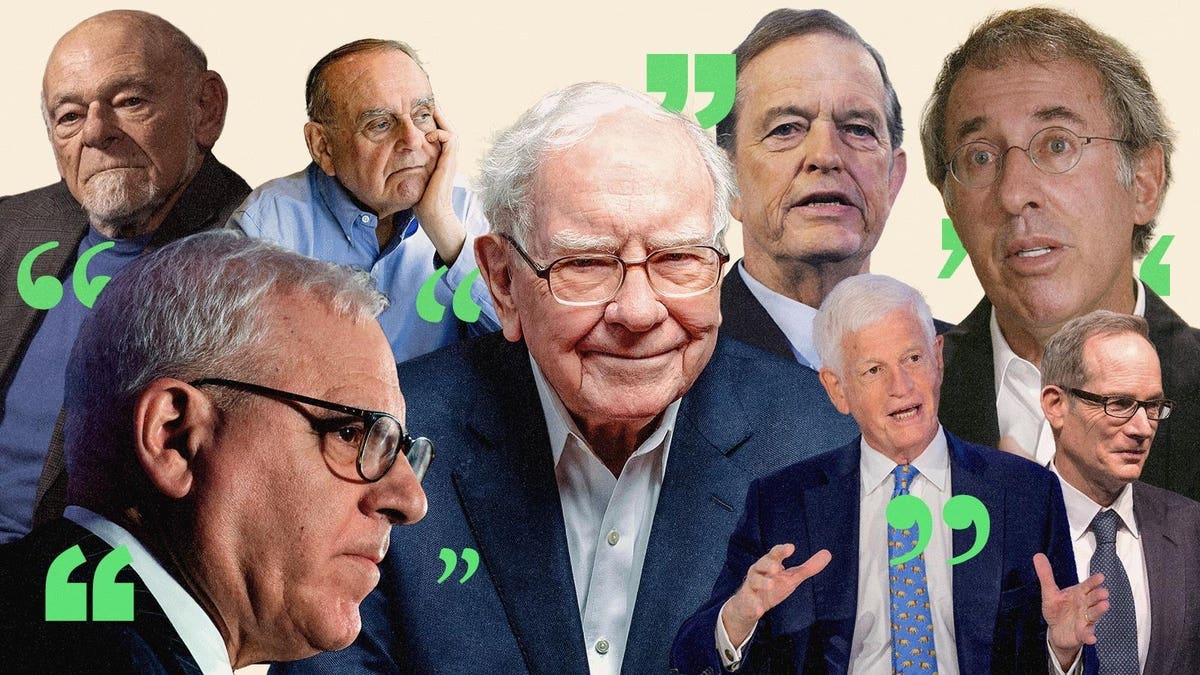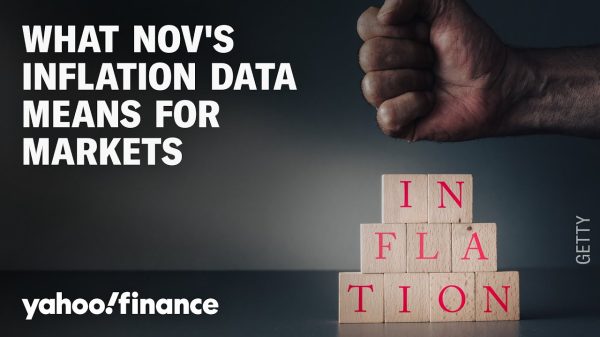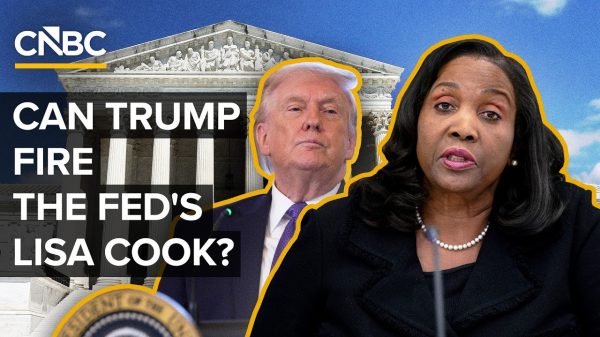How do you build enough wealth to reach the ranks of the Forbes 400 Richest Americans? Eight of the greatest investors of all time share strategies and life lessons that have guided them.
For more than 105 years Forbes has been reporting on the world’s smartest business minds and greatest investors. In 1969, Forbes Magazine first profiled Warren Buffett at a time when his Omaha-based Buffett Partnership was only 12 years old, but already had a value of $100 million and a 31% compounded annual return. In the article, Buffett described the stock market as like having a “manic-depressive partner,” insisting that investors not buy or sell stocks on its terms, but rather invest only when the prices were agreeable to them, based on fundamental research.
So far in 2023, Mr. Manic-Depressive Market, as measured by the S&P 500 has gained nearly 16%, after a dismal 2022 in which it fell 19%. The technology heavy Nasdaq Composite is up 31.7% in the first half of 2023, fueled largely by the excitement over artificial intelligence and companies pioneering the disruptive tech like Nvidia, Microsoft and Alphabet. The Nasdaq Composite is having its best first half since 1983. Last year it fell 33%.
What is in store for the second half of 2023? Despite the Federal Reserve’s rate hikes and its mission to cool the economy in an effort to bring down inflation, U.S. GDP is still strong, coming in at 2% for the first quarter and unemployment remains relatively low. The nation’s largest banks performed well during the Fed’s recent stress tests, and regional banks seem to have stabilized. But the jury is out on how increased capital requirements, coupled with the balance sheet losses hundreds of banks are sitting on, will ultimately affect the sector. Plus, there is no telling when the next bout of bad bank news fueled by social media hysteria could incite a run.
Establishing portfolio positions based on reading the economic tea leaves at any given point in time is best left to professional traders. A smarter tact is taking a long-term approach, informed by those with track records of great success. Last year, Forbes introduced a new monthly investment advisory service, Forbes Billionaire Investor, which not only tracks the favorite stocks of the world’s smartest and most successful investors, but also features in-depth interviews and profiles with this elite group. As the United States celebrates its 247th birthday, Forbes has curated a selection of investment–and life–wisdom based on the newsletter’s recent interviews with eight investment greats.
David Rubenstein
NET WORTH: $3.1B | COFOUNDER AND EXECUTIVE CHAIRMAN, CARLYLE GROUP
Math And Micromanaging
“Here’s what the great [investors] have in common: They came from blue-collar, middle-class families. They’re pretty well educated. They’re not high school dropouts. They have a pretty good facility for math. They have enormous intellectual curiosity. They really love to read as much as they can, even if it’s not about the area that they’re investing in. They are sponges for information. They like to make the final decision. They don’t want to delegate the decision and when they make a bad decision, they own up to it and get onto the next thing.”
Advice For Novice Investors
“The most important thing is to read, know what you’re getting into, and don’t think you’re a genius because you’re good at making widgets. Just be realistic in your rate of return expectations. The most important thing to recognize is that the biggest mistake people make is they sell when markets are going down and they buy when the markets are going up.”
Warren Buffett
NET WORTH: $112.5 BILLION | CEO AND CHAIRMAN, BERKSHIRE HATHAWAY
The Prospects And Threat Of Artificial Intelligence
It can do amazing things. Bill Gates brought me out the latest, maybe not the latest version, but one he thought I could handle, and it did these remarkable things, but it couldn’t tell jokes. When something can do all kinds of things, I get a little bit worried because I know we won’t be able to uninvent it. We did invent, for very good reason, the atom bomb in World War II but is it good for the next 200 years of the world that has been unleashed? Einstein said after the atom bomb that it changed everything in the world except how men think. I would say the same about AI. It can change everything in the world except how men think and behave, and that’s a big step to take.”
Opportunities
“The world is changing but new things don’t take away the opportunities. What gives you opportunities is other people doing dumb things and I would say that in the 58 years we’ve been running Berkshire, there’s been a great increase in the number of people doing dumb things and they do big dumb things. The reason they do it to some extent is because they can get money from other people so much easier than when we started, so you could start 10 or 15 dumb insurance companies in the last 10 years, and you could become rich if you were adroit at it, whether the business succeeded or not.”
Tribalism Vs. The United States
“Now the problem we have, I think, is the partisanship. It seems to be this move toward tribalism, and tribalism just doesn’t work as well. When it comes to tribalism, we don’t even hear the other side, and tribalism can lead to mobs, but if I still had a choice of any place to be born in the world, I’d want to be born in the United States and I’d want to be born today. It is a better world than we’ve ever had. We do need to think about different solutions in terms of how we get important problems solved. So far, it doesn’t look very promising, but then I’m sure that when Lincoln looked at what was going on in the Civil War, it didn’t look very promising either. The challenges are huge, but I think that the U.S. is capable of doing remarkable things, and it wouldn’t surprise me if we do it again.”
Ron Baron
NET WORTH: $4.9 BILLION | CHAIRMAN AND CEO, BARON FUNDS
On Switching From Value Investing To Growth
“When I first got started, it was about what a business was worth. It was based on what I thought a business was worth and then buying it at a discount to that. I bought a bunch of stocks like that, most of them worked out fine, but the ones that didn’t were just terrible investments and I couldn’t get out of them. So I said, that doesn’t sound like a very good idea. What turned out to be a better idea was investing in great businesses with growth potential, great people running them and a competitive advantage. I focused on sales growth as opposed to earnings per share growth.”
Advice For His 20-Year-Old Self
“You have to love what you do, really work hard and guard your reputation above everything else. By that, I mean the way you act when nobody sees what you’re doing. You have to ask yourself, would I be proud? One of the people who helped me early in my career was Jay Pritzker, who told me once, “Ron, if you need to have an agreement in writing, you’re doing business with the wrong person.” You have to live and die by your word. Whatever you say you’re going to do, you do. That was a really big lesson, living up to your word and being a handshake person.”
Greatest Investment Triumph
“It would be Tesla (TSLA)—that’s the one we’ve made the most from and the one I still think we’re going to make the most in the future…So we invested $380 million between 2014 and 2016, which has generated billions of dollars in gains for our clients over the years. I think we’re going to be getting a five, six or seven times return on our investment again in the next ten years. Now we’ve also been heavily investing in SpaceX.”
Sam Zell
NET WORTH: $5.2 BILLION | FOUNDER, EQUITY GROUP INVESTMENTS
The Dollar’s Supremacy
“The number one concern I have is the loss of the dollar as the reserve currency. I don’t think anybody really understands what an incredible benefit it is to the United States, and to our standard of living, that we in effect are the reserve currency. And we can print. But like any scenario, if you take it too far, if you debase the fiat currency to the point where people lose confidence in the reserve currency, then it’s going to have a pretty significant impact on the overall economic environment.”
Decarbonization
“The Biden administration came in and has just about done everything they can to inhibit the growth of fossil fuels. They’re operating under what I think is a fallacious assumption that within a relatively short period of time, like California, no more carbon fuel cars by 2035. I just don’t see how there’s any way that we can wean ourselves off of carbon energy within this timeframe. I don’t even think it’s close.”
Importance Of Liquidity
“Liquidity equals value. So we encourage all our companies to maintain high levels of liquidity. Because in the end, every period of economic stress has ended with a liquidity event or a real liquidity challenge, and how it’s addressed, separates the men from the boys.”
Leon Cooperman
NET WORTH: $2.5 BILLION | FOUNDER, OMEGA ADVISORS
Why Value Investing
“I have always been value oriented. I like to get more for my money than I pay. I’ve observed that technology is a double-edged sword. Somebody’s innovation is another’s obsolescence, so I’ve never understood paying high multiples for businesses when they could have a short run life. Look at Meta as a perfect example. TikTok seems to be taking their market away.”
Advice For 20-Somethings
“The most important advice I give the youngsters is that the only way to be successful is to do what you love and love what you do. I work 80-hour workweeks, but I never looked at it as work. I enjoyed what I did.”
Mario Gabelli
NET WORTH: $1.6 BILLION | CEO, GAMCO INVESTORS
A Hands-On Approach To Investment Research
“You basically take an annual report and you drill into it. So you look at that. But more importantly, because you follow an industry, you go in and read all the trade magazines, you go to all the conferences, you go see five, six companies…you get a feedback mechanism. For example, one time there was a company, Snap-on Tools, they then created Safety Clean. So I’m saying to myself, listen, I go to a local gas station guy and I say, what are you buying? We would go bottoms up in an industry.”
Advice For 20-Somethings
“Basically for a new investor, if you’re 20 years old and you grew up on Fortnite, you like to have short-term gains, think about the long term. That is the notion of compounding of value over an extended period of time. I have a grid that I use when I give college talks about how to become a billionaire. And that is to have one less [coffee], and take that money for that and invest it. So one less per day, and you’re putting $35 in a week, and you grow it at 4, 6, 8, 10% over the next 40 years, where are you going to be? So if you really want to help yourself, one less beer or one less White Claw.”
Glenn Dubin
NET WORTH: $2.8 BILLION | FOUNDER, DUBIN & CO.
Ride Trends, Bet On The Best
“I’m looking for a strategy, a region, an investment class, where the wind is at your back. That could be a new market, that could be a new product, that could be a secular change in the investment cycle. Then it’s going out and identifying talent, whether it be a portfolio manager, a trader, an analyst or a quantitative analyst, obviously depending upon the strategy and the business that you’re building. If you put those two things together—something where you have the wind at your back and you identify great talent, the probability of success is raised meaningfully.”
The Importance Of Experience
“A lot of people that are managing money today have done so only in a very favorable environment for risk assets, a low interest rate environment. We’re now in a tightening cycle. We’ve raised interest rates from effectively zero to 5% in a relatively short period of time, and it’s creating a lot of cracks in the system. If you don’t have the experience of managing through a rising interest rate cycle, you’re at a real disadvantage.”
Thomas James
NET WORTH: $2.3 BILLION | CHAIRMAN EMERITUS, RAYMOND JAMES FINANCIAL
Seek Ticket Takers
“I want to be a ticket taker at the toll bridge and get more money every year as more and more people go across the bridge. That’s the kind of company [stock] I want to Own. Right now I’m buying Verizon (VZ). It has a good yield [7%] and it’s priced at the low end of its range over the last five years [ P/E ratio of 7]. I’m not worried about it going broke.”
Just Say No To Market Timing
“If you look at almost any ten-year period, stocks go up. People are lousy at determining bottoms and tops. I like to use dollar-cost averaging and putting money into the market over a number of years. If you walk into my office with a lot of money, I say if you want to invest it over the next two years, we’ll do it quarterly eight times. You can’t beat the market long term.”
Steer Clear Of Hot Tips
“Avoid that guy who comes to you with a stock idea because it’s acting right, yet you can’t figure out what’s really going on at the company and it sounds like so much bull. Back in the bear market of 1974, I went to the best business school in history called the school of hard knocks. If you want to have your arrogance knocked out of your head, just go through a period like that. You have to take risk, but there are times when you do it and there are times when you don’t do it. Every retail investor doesn’t want to invest at the bottom of the market, but I want to invest at the bottom of the market.”
MORE FROM FORBES
Read the full article here












